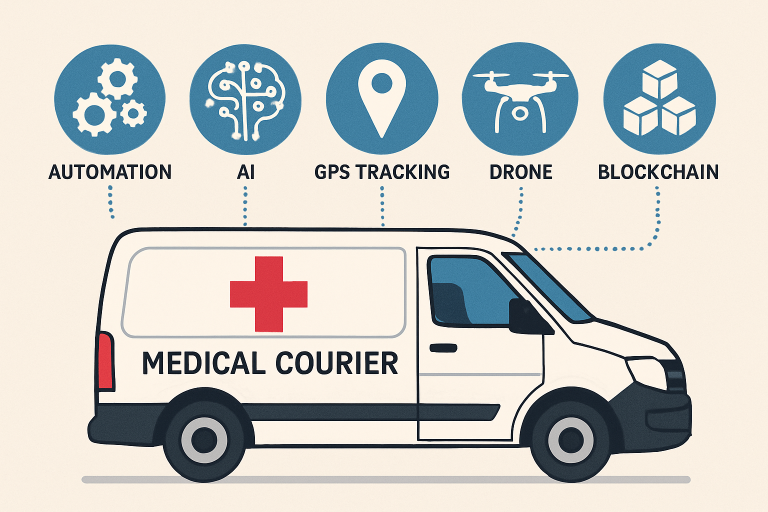
The rapid pace of advancements in healthcare requires equally swift and secure movement of essential supplies. Today’s medical courier services are transforming, leveraging technology to increase accuracy, speed, and reliability. From hospitals and clinics to research labs, healthcare providers now depend on these high-tech logistics systems to preserve patient health. In regions such as Georgia, services like prescription delivery Valdosta, GA, are crucial in ensuring the timely and accurate delivery of medications and medical supplies.
Automation, artificial intelligence (AI), and real-time tracking now play pivotal roles, ensuring that life-saving materials, such as pharmaceuticals, lab specimens, and medical devices, reach their destination on time and in optimal condition. As providers place heightened emphasis on patient outcomes and regulatory compliance, streamlined courier operations contribute directly to improved healthcare service delivery and patient safety.
The integration of these technologies doesn’t just improve efficiency or cut costs—it also builds transparency and trust in the health system. Both healthcare professionals and patients benefit from real-time tracking of orders, increased accountability, and a reduced risk of lost or mishandled deliveries. Through technology, medical courier services are redefining what’s possible in healthcare logistics.

Automation in Medical Courier Services
Automation is one of the core drivers transforming the operations behind medical courier services. Robotic systems and automated conveyor belts within medical distribution centers can sort and package shipments far faster and more accurately than manual labor. Automated fleet management optimizes vehicle assignments, minimizing idle time and matching deliveries with available drivers according to real-time needs.
Technologies such as automated load scheduling and dispatch enhance responsiveness and reduce turnaround times, particularly during periods of high demand. Medical couriers utilizing automated systems can efficiently address both routine and urgent requests, ensuring on-time delivery for everything from chemotherapy doses to blood samples. The rise of automation makes healthcare logistics more agile and better equipped to handle the unpredictability of healthcare demand.
Artificial Intelligence and Route Optimization
Artificial intelligence is redefining route planning and resource allocation in courier services. AI-powered predictive analytics allows medical courier providers to proactively assess and adapt to traffic patterns, weather disruptions, and other variables that can impact delivery times. Instead of reactive problem-solving, AI systems generate optimal routes and delivery schedules in advance—making delays the exception rather than the rule.
AI algorithms also help monitor supply levels, prioritize urgent requests, and dynamically respond to new pickup or drop-off points. By learning from historical delivery data, intelligent systems continually refine their route recommendations, enabling couriers to deliver faster and conserve fuel. This not only supports better patient care by reducing wait times but also aligns with broader healthcare sustainability goals.
Real-Time Tracking and Temperature Monitoring
Real-time GPS tracking technology has become a standard in modern medical courier operations. Healthcare providers and patients can monitor the live progress of deliveries, ensuring visibility and peace of mind. This transparency enables quick rerouting or escalation in the event of a delay, reducing missed appointments and supporting improved patient outcomes. As highlighted in this Forbes article, GPS innovations have fundamentally transformed logistics and transportation systems across industries, offering unprecedented precision and efficiency that now underpin critical healthcare deliveries.
Many medical payloads, such as vaccines, tissue samples, and blood products, are temperature-sensitive and require tightly controlled conditions. Internet of Things (IoT) sensors monitor shipments and vehicles in real-time, continuously logging temperature, humidity, and location data. Automated alerts notify drivers and dispatchers if a shipment risks exceeding its prescribed limits, allowing for immediate corrective action.
Verifiable environmental controls and secure, traceable delivery methods are not only good practice; regulations in many healthcare domains also require them. Comprehensive real-time monitoring helps prevent spoilage and compliance risks, ultimately protecting patients and the general population.
Drones and Autonomous Vehicles
The deployment of drones and autonomous vehicles in medical courier services is expanding access to vital healthcare, especially in underserved and remote communities. Drones deliver smaller, time-sensitive items—like lab results, diagnostic kits, or life-saving medications—to otherwise hard-to-reach locations, bypassing traffic congestion and infrastructure barriers.
In emergencies, such as delivering Automated External Defibrillators (AEDs), drones have already proven their life-saving potential. Meanwhile, self-driving vehicles are being introduced for both local and long-range transport of medical cargo, with advanced navigation and climate control systems for secure and reliable deliveries.
These innovations not only increase asset utilization and minimize labor requirements but also enhance the overall speed and reliability of healthcare supply chains.
Blockchain for Secure Logistics
Security and transparency are critical to the trust and reliability of medical courier services. Blockchain technology addresses these needs by documenting every handoff, temperature reading, and update in a tamper-resistant digital ledger. This immutable record streamlines audits and compliance checks, while also ensuring that providers’ specimens, medications, and records remain uncompromised.
Blockchain can also be utilized in conjunction with AI to verify identities, confirm secure delivery, and authenticate permissions within healthcare supply chains. As privacy and security standards in healthcare continue to evolve, blockchain will play an increasingly important role in protecting patient safety and ensuring institutional accountability.
Future Trends in Medical Courier Services
The coming years promise further innovation for medical logistics. Increased automation and widespread adoption of AI will drive even greater predictive accuracy and operational efficiency. The sustainability movement is prompting courier companies to invest in electric and hybrid vehicles, thereby further reducing their environmental impact. Eco-friendly packaging, reusable containers, and zero-emission delivery options are also gaining prominence.
Blockchain technology is poised to become a standard for transparent and secure logistics tracking. Additionally, AI will enable adaptable, personalized delivery models that respond not only to institutional needs but also to patient-specific requirements for medication timing, safety, and handling.
As technology continues to evolve, patients and healthcare providers can expect more reliable, traceable, and convenient medical delivery services, helping to bridge logistical gaps that often stand in the way of wellness and timely care.
Conclusion
The integration of cutting-edge technologies—such as automation, AI, real-time tracking, drones, and blockchain—is reshaping the future of medical courier services. These innovations ensure that critical medical items are delivered securely, efficiently, and on time while meeting the highest standards of regulatory compliance and patient care. As healthcare logistics continues to evolve, the ability to rely on high-performing delivery partners will remain pivotal to safeguarding public health and advancing medical excellence.






